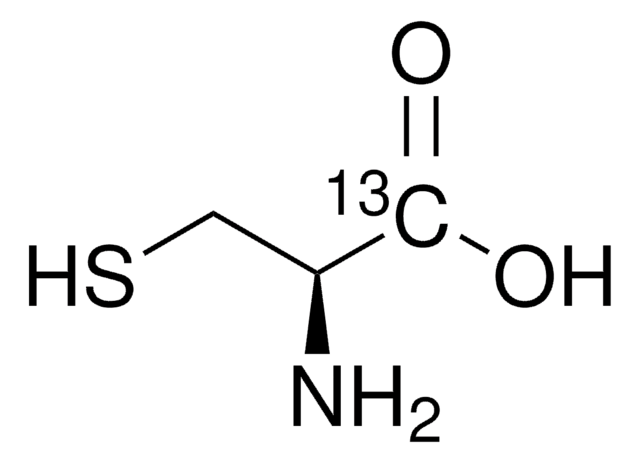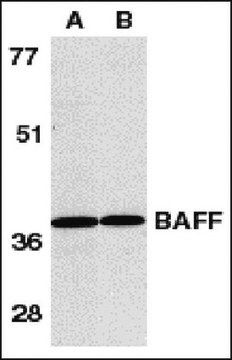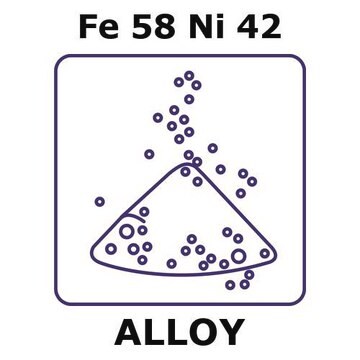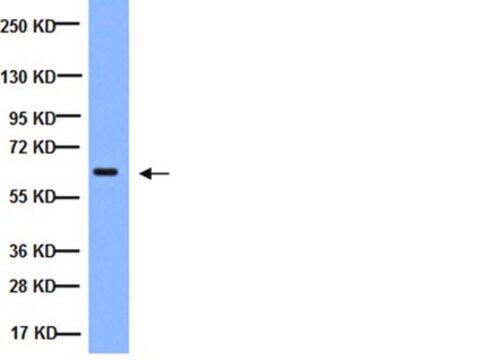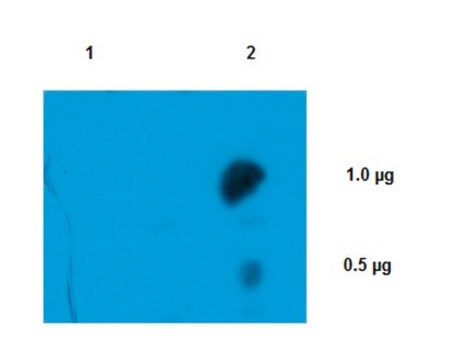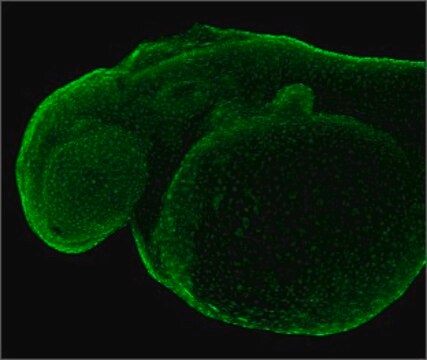ABT1389
Anti-Phospho Lamin A/C (Ser22)
from rabbit
Sinônimo(s):
Prelamin A/C, Renal carcinoma antigen NY-REN-32
About This Item
Produtos recomendados
fonte biológica
rabbit
forma do anticorpo
affinity isolated antibody
tipo de produto de anticorpo
primary antibodies
clone
polyclonal
reatividade de espécies
human
técnica(s)
inhibition assay: suitable (peptide)
western blot: suitable
Isotipo
IgG
nº de adesão NCBI
nº de adesão UniProt
modificação pós-traducional do alvo
phosphorylation (pSer22)
Informações sobre genes
human ... LMNA(4000)
Descrição geral
Is cleaved to generate Lamin A/C. Farnesylation of prelamin-A/C facilitates nuclear envelope targeting and subsequent cleavage by ZMPSTE24/FACE1 to remove the farnesyl group produces mature Lamin-A/C that is inserted into the nuclear lamina. Lamin A and C are present in equal amounts in the lamina of mammals and they play an important role in nuclear assembly, chromatin organization, nuclear membrane and telomere dynamics. Lamins are shown to be essential for normal development of peripheral nervous system and skeletal muscle and for muscle satellite cell proliferation. Lamins also prevent fat infiltration of muscle and bone marrow, helping to maintain the volume and strength of skeletal muscle and bone. Phosphorylation of Lamins is reported to occur continuously throughout all interphase periods and takes place mainly on the assembled lamina. Phosphorylation of the major polypeptides of the lamina induces laminar disassembly during mitosis. Phosphorylated Lamin-A/C localizes to nucleoplasm. Lamin A/C undergoes phosphorylation at multiple sites and one of the best characterized phosphorylation sites is on Serine 22 and it is phosphorylated during interphase. Phosphorylation of Serine 22 stabilizes Lamin A/C. Overexpression of Lamin-A is shown to result in greater phosphorylation of Serine 22 and 390 and Lamin A/C knockdowns display reduced phosphorylation at both sites, which helps in maintaining the integrity of the diminished lamina. Mutations in LMNA gene can cause Emery-Dreifuss muscular dystrophy 2 and 3, which are characterized by weakness and atrophy of muscle without involvement of the nervous system and cardiac conduction defects. Some mutations have also been linked to familial Lipodystrophy that leads to the loss of subcutaneous adipose tissue in the lower parts of the body and accumulation of adipose tissue in the face and neck. (Ref.: Buxboim, A., et al. (2014). Curr. Biol. 24(16): 1909-1917).
Especificidade
Imunogênio
Aplicação
Cell Structure
Qualidade
Western Blotting Analysis: A 1:500 dilution of this antibody detected Phospho Lamin A/C (Ser22) in A549 cell lysate.
Descrição-alvo
forma física
Armazenamento e estabilidade
Outras notas
Exoneração de responsabilidade
Não está encontrando o produto certo?
Experimente o nosso Ferramenta de seleção de produtos.
Certificados de análise (COA)
Busque Certificados de análise (COA) digitando o Número do Lote do produto. Os números de lote e remessa podem ser encontrados no rótulo de um produto após a palavra “Lot” ou “Batch”.
Já possui este produto?
Encontre a documentação dos produtos que você adquiriu recentemente na biblioteca de documentos.
Nossa equipe de cientistas tem experiência em todas as áreas de pesquisa, incluindo Life Sciences, ciência de materiais, síntese química, cromatografia, química analítica e muitas outras.
Entre em contato com a assistência técnica

